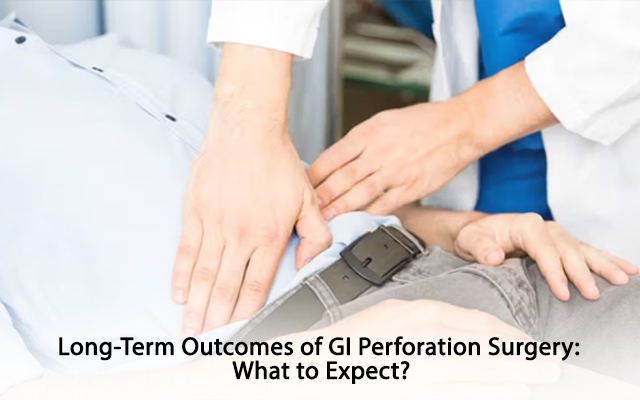Gastrointestinal (GI) perforation is a serious condition where a hole develops in the wall of your digestive tract, causing its contents to leak into the abdominal cavity. This can lead to severe complications, and often, surgery is needed to repair the damage and prevent life-threatening issues. If you’re considering GI perforation surgery, consulting the top doctors of SH Binayak Multi-speciality Hospital will help you in understanding the complications post-surgery.
What is GI Perforation Surgery?
GI perforation surgery aims to fix a tear in the digestive tract, which can involve the stomach, intestines, or other parts of the GI system. This procedure can be done in two main ways:
- Open Surgery: This involves a larger incision to access and repair the perforation directly.
- Laparoscopic Surgery: This minimally invasive technique uses several small incisions and special instruments to perform the repair. The method chosen depends on the perforation’s size and location, as well as your overall health.
What to Expect in the Long Term?
1. Recovery Period
In the initial stages of recovery from GI perforation surgery, you’ll likely spend some time in the hospital where doctors will keep a close eye on you for any signs of infection or complications.
Pain and discomfort are normal, but they can be managed with medication. As you begin to heal, your doctor will suggest you to start reintroducing solid foods into your diet and gradually returning to your daily routines.
2. Digestive Health
Some people experience changes in their bowel habits, like diarrhea or constipation, but these usually improve as time goes on. Maintaining a balanced diet and staying hydrated are essential for supporting your digestive health. Depending on how extensive the surgery was, you might need to make long-term changes to your diet.
3. Potential Complications
Even with surgery aimed at preventing complications, some risks remain. Possible issues include infections, scar tissue formation, or bowel obstructions. Regular follow-ups with your healthcare provider will be crucial to catch and address any problems early.
4. Long-Term Health Monitoring
Your doctor may recommend periodic imaging tests or endoscopic exams to ensure everything is healing as it should. These follow-ups help ensure your GI tract continues to function well.
5. Lifestyle Adjustments
Adapting to life after GI perforation surgery may involve some changes. Maintaining a healthy weight, staying active and avoiding foods that irritate your digestive system can make a big difference. Your healthcare provider will offer guidance tailored to your specific needs and situation.
Conclusion
The road to recovery after GI perforation surgery varies from person to person and depends on the extent of the procedure. However, with diligent care and regular check-ups by doctors specializing in GI surgery, many patients find they can return to a normal, healthy life.



